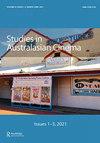The creative sustainability of screen business in the Australian regions
IF 0.7
0 FILM, RADIO, TELEVISION
引用次数: 2
Abstract
ABSTRACT Public focus on screen business in Australia has been shaped by the information needs of the regulatory and content investment agencies that monitor and support screen content made under the creative control of Australians. This has meant that available data has concentrated on the types of content that have been deemed to require regulatory support – feature films, documentaries and television drama, with more recent interest in short-form content intended for streaming and online platforms and games. The expansion of the notion of screen business has led to a series of Screen Australia reports that focused the debate on value frameworks that included cultural, economic and audience values. These reports informed the 2017 Federal Government inquiry into the Australian Film and Television Industry – they do not, however, provide insights into how screen business is incorporated into localised regional economies and they tend to downplay the cultural contributions from the television and advertising sectors. By looking at screen business in four regional Australia cities we demonstrate how four modes of screen production, which include commercial and corporate content, is being made sustainably in the regions and that regional screen content production activities are an important part of the national screen production ecosystem.澳大利亚地区屏幕业务的创造性可持续性
在澳大利亚,公众对屏幕业务的关注受到监管和内容投资机构的信息需求的影响,这些机构监控和支持澳大利亚人创造性控制下的屏幕内容。这意味着,现有数据主要集中在被认为需要监管支持的内容类型上——故事片、纪录片和电视剧,而最近人们对流媒体、在线平台和游戏的短格式内容更感兴趣。屏幕业务概念的扩展导致了一系列澳大利亚屏幕报告,这些报告集中讨论了包括文化,经济和观众价值在内的价值框架。这些报告为2017年联邦政府对澳大利亚电影和电视行业的调查提供了信息——然而,它们并没有提供有关屏幕业务如何融入当地区域经济的见解,而且它们往往低估了电视和广告部门的文化贡献。通过观察澳大利亚四个区域城市的屏幕业务,我们展示了四种屏幕制作模式,包括商业和企业内容,如何在该地区可持续地进行,以及区域屏幕内容制作活动是国家屏幕制作生态系统的重要组成部分。
本文章由计算机程序翻译,如有差异,请以英文原文为准。
求助全文
约1分钟内获得全文
求助全文

 求助内容:
求助内容: 应助结果提醒方式:
应助结果提醒方式:


